We wtorek, 7 września, w Karpaczu rozpoczęła się jubileuszowa – 30. edycja „Europy Karpat”. W pierwszym dniu konferencji polscy i zagraniczni eksperci, politycy oraz naukowcy rozmawiali o problemach Europy Środkowo-Wschodniej i zacieśnianiu współpracy, nowych wyzwaniach w polityce międzynarodowej, bezpieczeństwie energetycznym oraz zmianach społeczno-ekonomicznych. Organizatorem konferencji „Europa Karpat” jest Kancelaria Sejmu, zaś partnerem wydarzenia jest Instytut Współpracy Polsko-Węgierskiej im. Wacława Felczaka. W wydarzeniu organizowanym w ramach Forum Ekonomicznego w Karpaczu uczestniczy szef Kancelarii Sejmu Agnieszka Kaczmarska.
Oficjalnego otwarcia dokonał Marek Kuchciński, pomysłodawca i lider projektu Europa Karpat. – 30. edycja konferencji wiąże się z kilkoma pojęciami: wytrwałość i wielkie horyzonty. Patrzymy ze szczytów Karpat na otoczenie polityczne, społeczne, na nasze życie i aktywność. Zaczynamy naszą konferencję panelem, w którym o przyszłości Europy i Europy Środkowej będą mówić młodzi Europejczycy – powiedział były marszałek Sejmu, obecnie przewodniczący Komisji Spraw Zagranicznych.
Młodzi/młodzież (Europy Środkowej) o przyszłości Europy
W panelu inaugurującym spotkanie dyskutowano o zacieśnianiu relacji w regionie Europy Środkowo-Wschodniej, podtrzymywaniu wartości chrześcijańskich i rodzinnych.
Podsekretarz stanu w ministerstwie zasobów ludzkich Węgier Zsófia Rácz nawiązała w wystąpieniu do przyjętej tego lata Deklaracji Krasiczyńskiej, wspólnego oświadczenia uczestników polsko-węgierskiego Uniwersytetu Letniego w Krasiczynie, w którym zadeklarowali oni wspólną pracę „na szczeblu politycznym i obywatelskim, na rzecz wolnej, bezpiecznej, silnej i sprawiedliwej Europy”. – Deklaracja Krasiczyńska przyjęta została z dużym zainteresowaniem i odbiła się szerokim echem. Dotyczy ona pamięci o naszych korzeniach w Europie. W Krasiczynie mówiliśmy o silnych podziałach ideologicznych w Europie, frakcji konserwatywnej, a z drugiej strony liberalnej. Musimy pamiętać o naszej przeszłości, o tym, że na nas – młodych ludziach – spoczywa wielka odpowiedzialność. Musimy kwestionować pewne rzeczy, ale też proponować pozytywne rozwiązania i mieć wizję przyszłości – podkreśliła.
Punkt widzenia polskiej strony rządowej przedstawił sekretarz stanu w Kancelarii Prezesa Rady Ministrów, pełnomocnik rządu ds. polityki młodzieżowej Piotr Mazurek. – Tematyka współpracy międzynarodowej przedstawicieli młodego pokolenia w sposób szczególny z Europy Środkowo-Wschodniej to jeden z kluczowych tematów, jaki powinniśmy poruszać. Współpraca wydaje się naturalna i potrzebna. Jestem przekonany, że będzie można ją poszerzać. Z punktu widzenia polskiego rządu bardzo istotne jest wspieranie zaangażowania młodych ludzi w życie publiczne, zaangażowania obywatelskiego, włączania młodych ludzi w procesy decyzyjne i my to robimy na wszystkich możliwych poziomach. Z jednej strony powołaliśmy na poziomie centralnym Radę Dialogu z Młodym Pokoleniem – nowy organ, funkcjonujący pierwszy raz w polskiej historii, w ramach którego przedstawiciele Prezydenta, Premiera, ministrów, wchodzą w stały dialog poprzez regularne spotkania, prace z przedstawicielami środowisk młodzieżowych, organizacji pozarządowych – mówił.
– Dla zdecydowanej większości białoruskiego społeczeństwa, ale przede wszystkim dla młodzieży Unia Europejska i Europa jako całość pozostaje symbolem dobrobytu. Polska i Litwa stały się w ostatnim czasie krajami, które są wyznacznikami tej Europy – ocenił z kolei wykładowca białoruskiego Studium Europy Wschodniej, redaktor magazynu „New Eastern Europe” Maxim Rust.
Stefan Tompson, polsko-brytyjski dziennikarz i publicysta zaznaczył, że nigdy wcześniej nie miał większych nadziei na przyszłość tego regionu, jak teraz. – Nigdy nie byłem tak optymistyczny biorąc pod uwagę to, co udało się osiągnąć w czasach transformacji, np. te 27 lat wzrostu gospodarczego w Polsce. Musimy wykorzystać możliwości, które mamy – stwierdził.
Głos w dyskusji zabrał także Ferenc Almassy, francusko-węgierski dziennikarz. – Sprzeciw Grupy Wyszehradzkiej wobec niekontolowanej migracji był momentem pobudki dla wielu Europejczyków, którzy zrozumieli, że nie musimy iść za Europą Zachodnią we wszystkim. Mamy własne wybory i możemy je podejmować. Jesteśmy tak samo Europejczykami jak inni i mamy takie samo prawo do dyskusji o przyszłości kontynentu. Powinniśmy zrozumieć, że świat się zmienia, Europa jest w bardzo trudnym położeniu. Globalizacja przyniosła dużo bogactwa Europie, ale również wielkie zmiany kulturowe. Straciliśmy bardzo dużo z naszych wartości moralnych, które były naszym fundamentem. Gospodarka to zbyt mało – zaakcentował redaktor naczelny portalu informacyjnego Visegrad Post.
W pierwszym wtorkowym panelu wypowiedział się także wiceprezes Kijowskiej Wyższej Szkoły Ekonomii Jegor Stadny. – Patrząc na Zachód uczymy się jak świat mógłby być lepszy, ale często zapominamy jak się zachowywać. Nie radzimy sobie dobrze z nauką młodzieży odpowiedzialności, tłumaczeniem że oni są przyszłością. Nie widać aktywności, inicjatywy ze strony młodych – ubolewał ukraiński prelegent.
Sviatoslav Yurash, deputowany Rady Najwyższej Ukrainy, przypomniał o podejmowanych wspólnych inicjatywach, takich jak Trójkąt Lubelski czy Trójmorze. Wspomniał także o wspólnej deklaracji polsko-ukraińskiej sprzed kilku miesięcy zakładającej zbliżenie pomiędzy krajami. – Będziemy podejmowali wszystkie możliwe kroki, które będą prowadziły do naszego zbliżenia, musimy wspólnie definiować Europę – podkreślił.
Moderatorem dyskusji był Sebastien Meuwissen, polsko-belgijski dziennikarz, redaktor portali informacyjnych Visegrad Post oraz Stand For Christians.
Nowe wyzwania w polityce międzynarodowej: USA – Europa – Rosja – Chiny
W 2. części wtorkowych obrad szefowie dyplomacji Polski i Wegier rozmawiali m.in. o nowych wyzwaniach w polityce międzynarodowej.
Péter Szijjártó, minister spraw zagranicznych i handlu Węgier, za największe wyzwania uznał hipokryzję, stosowanie podwójnych standardów, brak prawdziwej demokratycznej debaty w Europie. – Rozmawiamy o wyzwaniach, o wzmacnianiu UE. Podczas tych rozmów na forum Unii ci, którzy prezentują poglądy inne niż mainstreamowe są wypychani z debaty publicznej. Jest to antydemokratyczne. Dopóki nie będzie przestrzeni na debatę prawdziwie demokratyczną i zrównoważoną, nie będziemy w stanie odpowiedzieć w sposób skuteczny na wyzwania przyszłości – podkreślił węgierski polityk.
– Największym wyzwaniem jakie stoi przed nami jest uratowanie projektu europejskiej integracji. Wstępowaliśmy do innej Unii. Za kwintesencję integracji rozumieliśmy ideę wolnego rynku opartego o cztery filary: wolność poruszania się osób, kapitału, pracowników i usług. Dziś z tymi wolnościami nie jest najlepiej. Mamy do czynienia z tendencjami protekcjonistycznymi. To, co zachęcało nas do przystąpienia do UE, teraz ulega ograniczeniu. Druga sprawa ma wymiar instytucjonalny. W UE fascynowała nas wspólnota prawa, wspólne działanie w oparciu o traktaty. Instytucje unijne powiększają swoje kompetencje w sposób pozatraktatowy. To niebezpieczne zjawisko – podkreślił minister spraw zagranicznych Zbigniew Rau.
Moderatorem dyskusji w drugim panelu był Przemysław Żurawski vel Grajewski, wykładowca Akademii Dyplomatycznej MSZ, stały doradca sejmowej Komisji Spraw Zagranicznych.
Dyplomacja parlamentarna Trójmorza
W ramach tego panelu przedstawiciele komisji spraw zagranicznych państw Trójmorza omówili postulat utworzenia wymiaru parlamentarnego tej inicjatywy.
– Nasza współpraca parlamentarna powinna odzwierciedlać wspólnotę celów. W ramach Trójmorza mamy możliwość realizacji tych celów. Od samego początku ta inicjatywa jest formatem żywym, ewoluującym z roku na rok – mówiła przewodnicząca Komisji Spraw Zagranicznych Izby Deputowanych Rumunii Rozália-Ibolya Biró.
Zsolt Németh, szef Komisji Spraw Zagranicznych Zgromadzenia Narodowego Węgier, stwierdził, że Trójmorze to nie jest organizacja lecz „młody, bardzo duży, istotny projekt polityczny”. – Skupia się on na budowaniu infrastruktury północ – południe dla współpracy w naszej części kontynentu. Naszą najważniejszą misją jest odbudowa Europy Środkowej. Mamy możliwości, warunki gospodarcze. Rządy coraz bardziej angażują się w projekty Trójmorza – stwierdził.
Marek Kuchciński, przewodniczący sejmowej Komisji Spraw Zagranicznych, przypomniał, że wielokrotnie w czasie pandemii rozmawiano o możliwościach zacieśnienia współpracy parlamentarnej. – 30 lat wolnych narodów w Europie Środkowej to czas, w którym dokonały się ogromne postępy. Jednym z naszych podstawowych celów jest zapewnienie warunków rozwoju społeczeństw, rodzin, a także zapewnienie współpracy z sąsiadami. Wymiar parlamentarny powinien być obecny jako jeden z najważniejszych, nasze parlamenty podejmują decyzje zatwierdzając politykę państw czy wspierając w kategoriach międzynarodowych naszą współpracę. W tej sposób budujemy stabilność i poczucie bezpieczeństwa i przyjaznego nastawienia – mówił były marszałek Sejmu.
Davor Ivo Stier, reprezentujący Komisję Spraw Zagranicznych Zgromadzenia Chorwackiego, przypomniał że Inicjatywa Trójmorza została zapoczątkowana na poziomie prezydentów. – Teraz rządy i parlamenty coraz bardziej się w nią angażują. Ogromnym krokiem naprzód było powstanie wspólnego funduszu inwestycji. Potrzebujemy większej widoczności, konkretnych działań, powinniśmy zaangażować się w informowanie naszych obywateli na temat inicjatywy. Warto pomyśleć o współpracy komisji parlamentarnych, które zajmują się transportem, infrastrukturą, energią – wymieniał.
– Dzięki współpracy parlamentarnej możemy skoordynować działania i stworzyć strategiczne podejście do łączności w krajach Europy Środkowej. Ważne jest angażowanie parlamentów w rozmowy, wymianę koncepcji tej inicjatywy – mówił z kolei przewodniczący Komisji Spraw Zagranicznych Saeimy Łotwy Rihards Kols.
Žiga Turk, b. minister ds. rozwoju oraz reform gospodarczych i społecznych Słowenii, odniósł się do koncepcji instytucjonalizacji współpracy pomiędzy krajami regionu. – Proponujemy stworzenie budżetu cyfryzacyjnego w każdym kraju po to, by stworzyć mechanizm koordynacji wspólnego wykorzystywania pozostałej części środków. Mamy wspólną geografię, historię, kulturę, mamy bardzo kompatybilne przemyślenia. Musimy znaleźć konkretne projekty wokół których możemy wykorzystywać istniejącą pomiędzy nami synergię – podkreślił.
Moderatorem dyskusji w trzecim panelu był Grzegorz Górny, prezes Zarządu Stowarzyszenia Trójmorze.
Retransmisja konferencji: YouTube
tekst: Centrum Informacyjne Sejmu
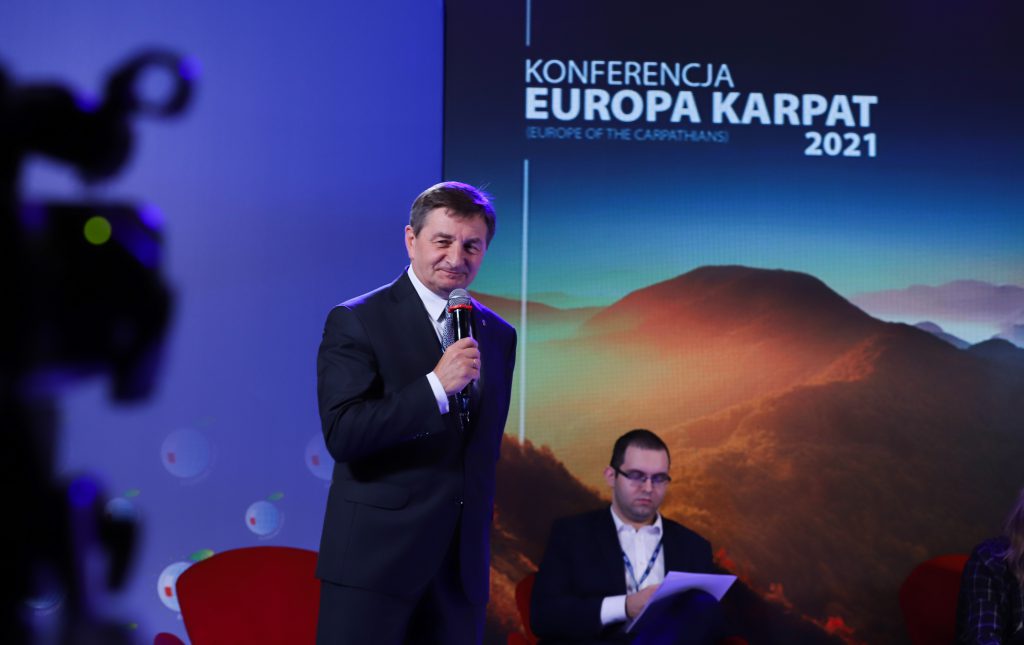
fot. Marta Olejnik
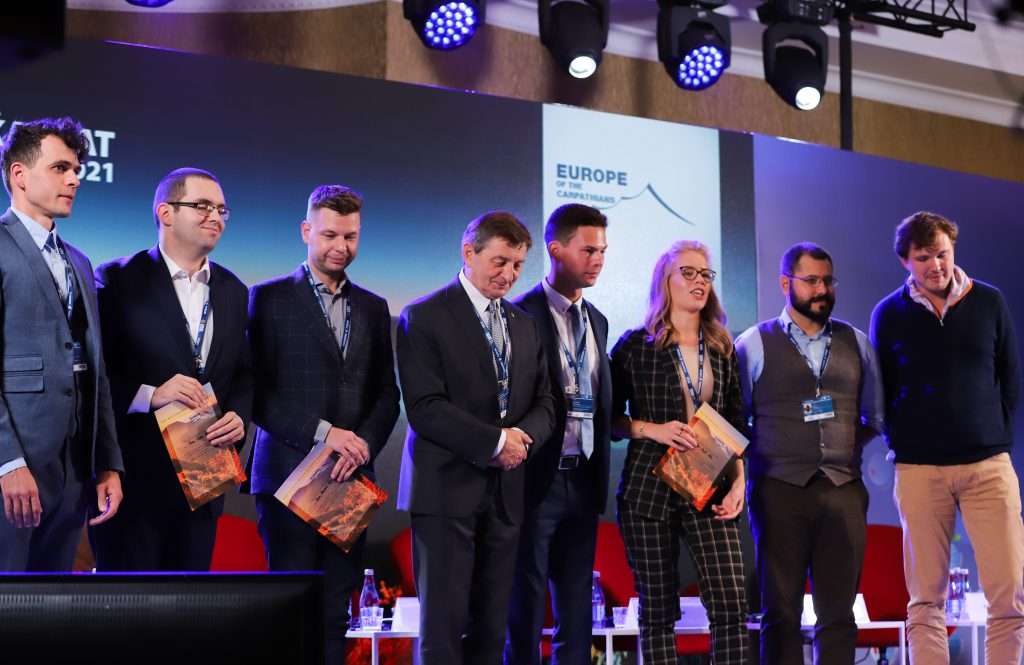
***
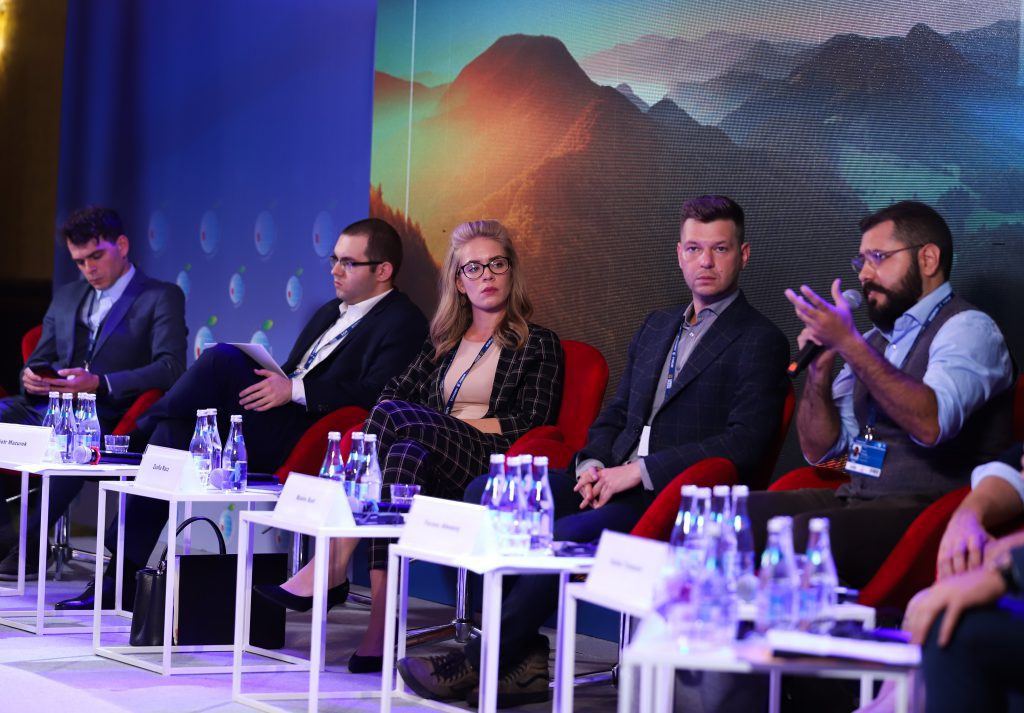
Karpacz: 30th edition of the Europe of the Carpathians Conference as part of the Economic Forum. Day 1
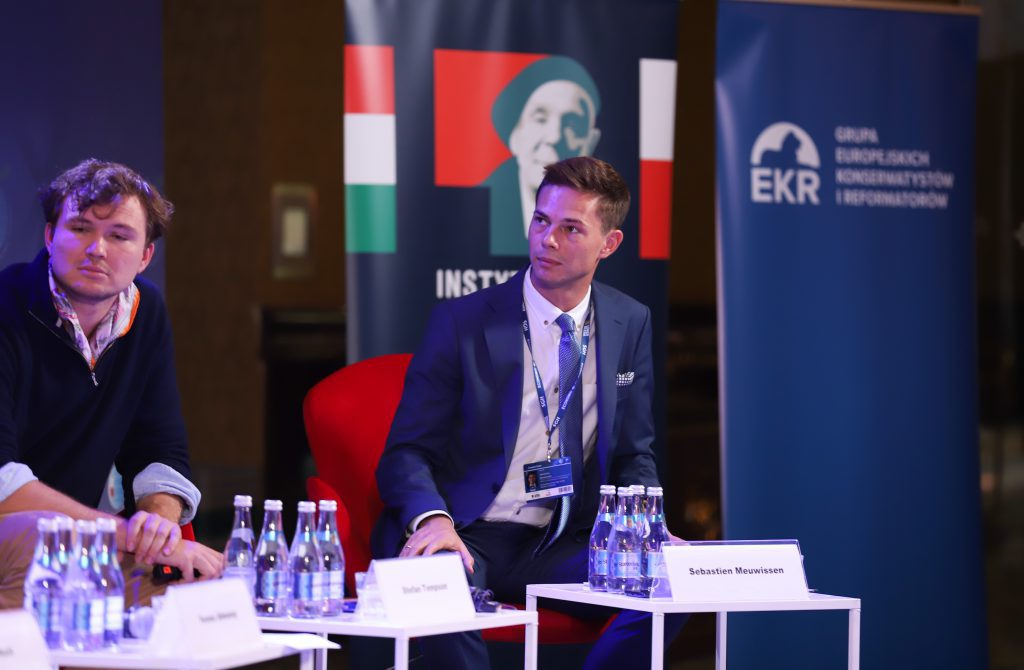
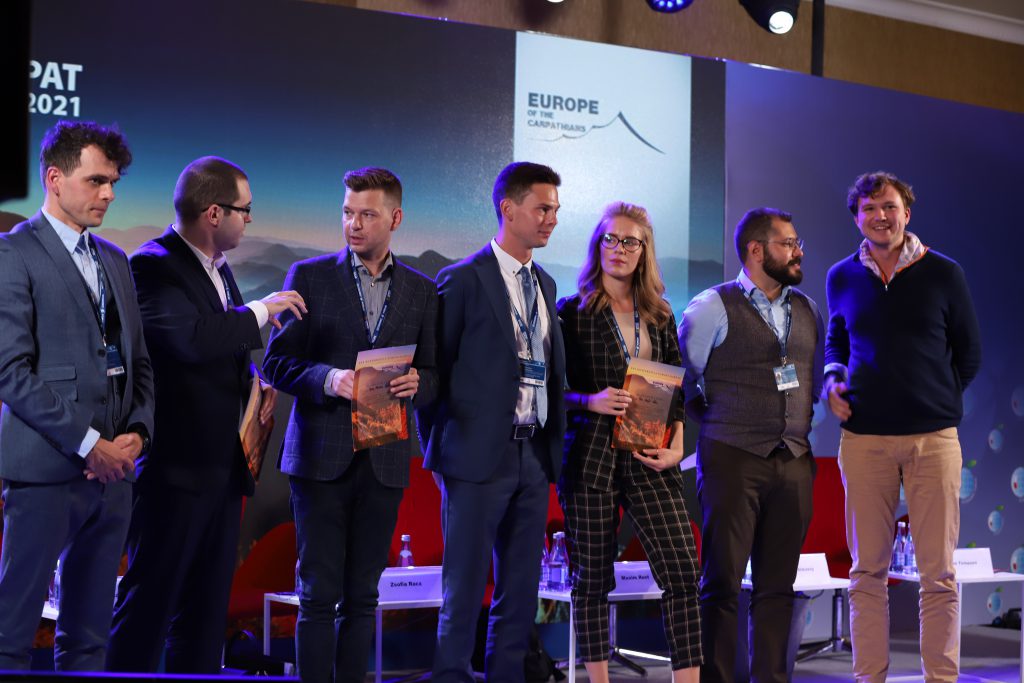
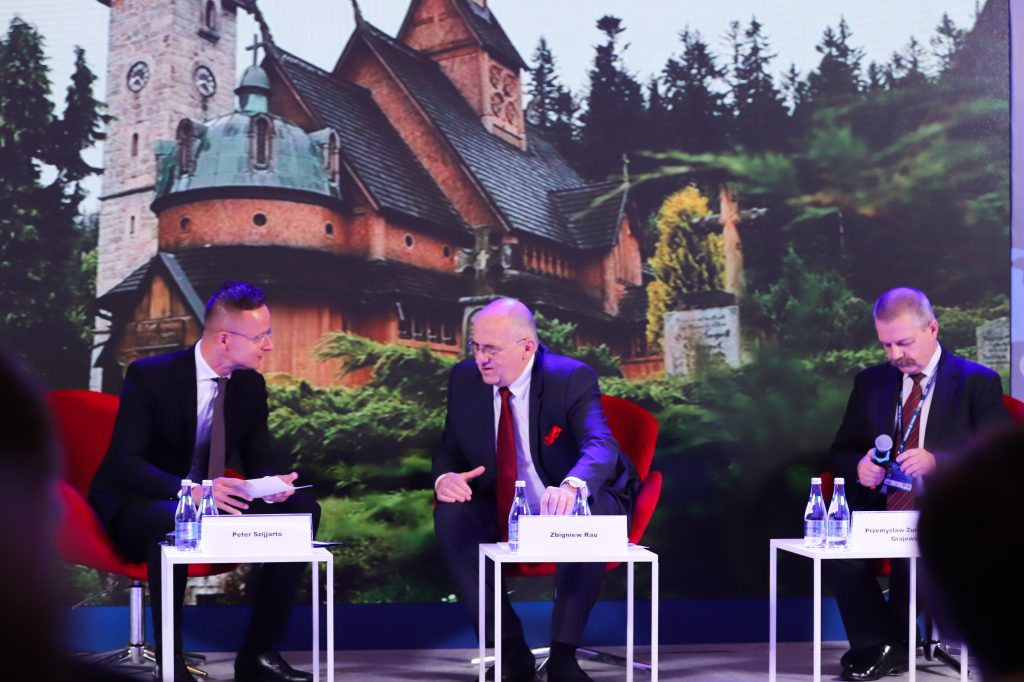
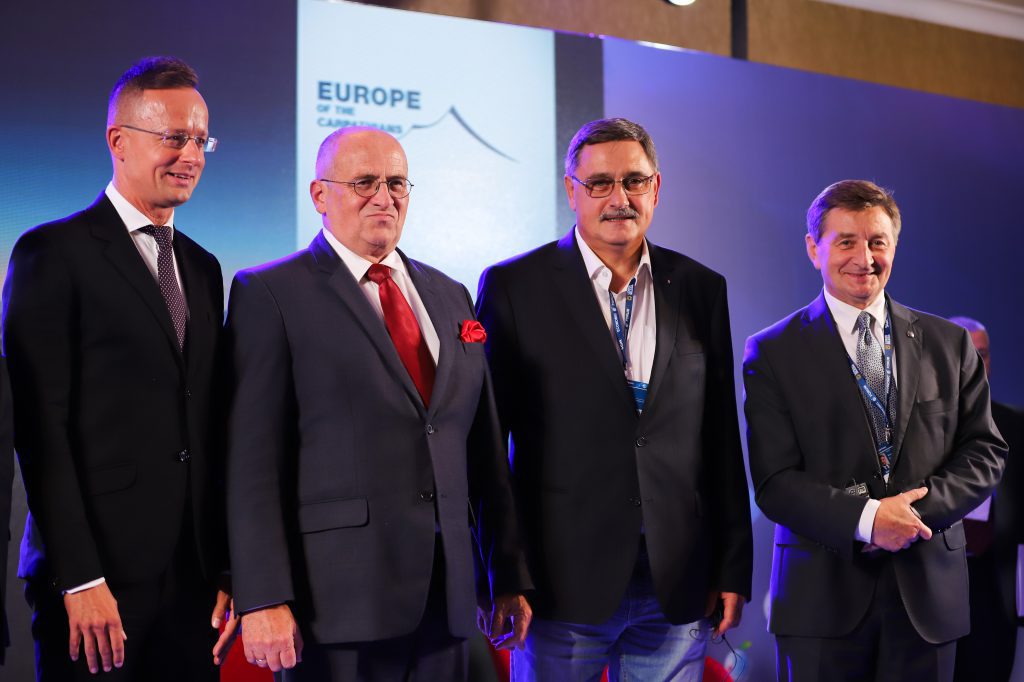
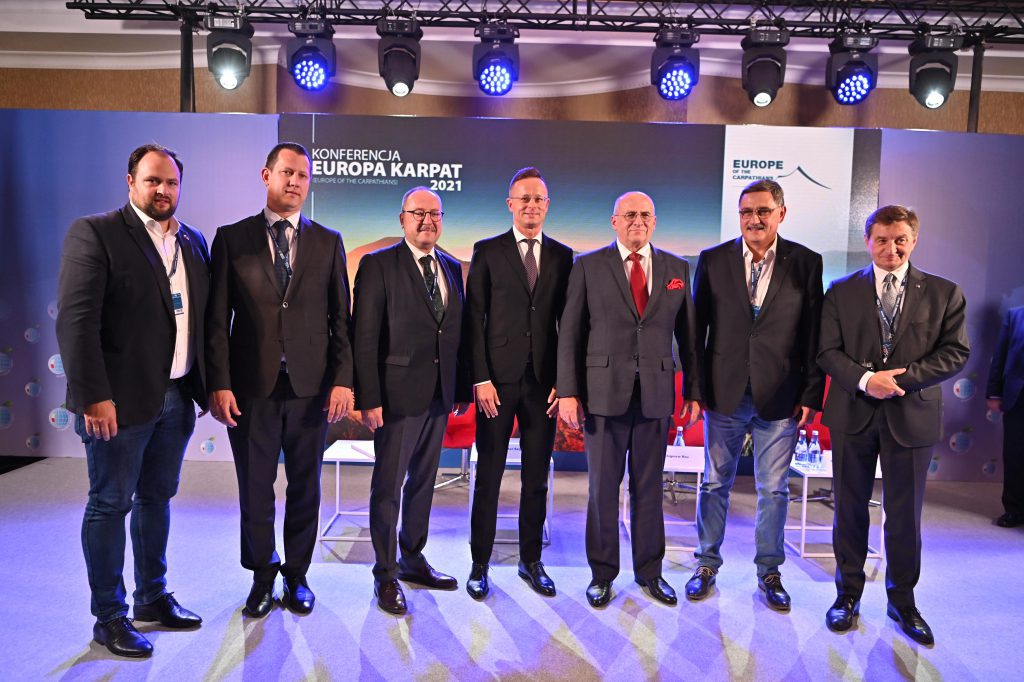
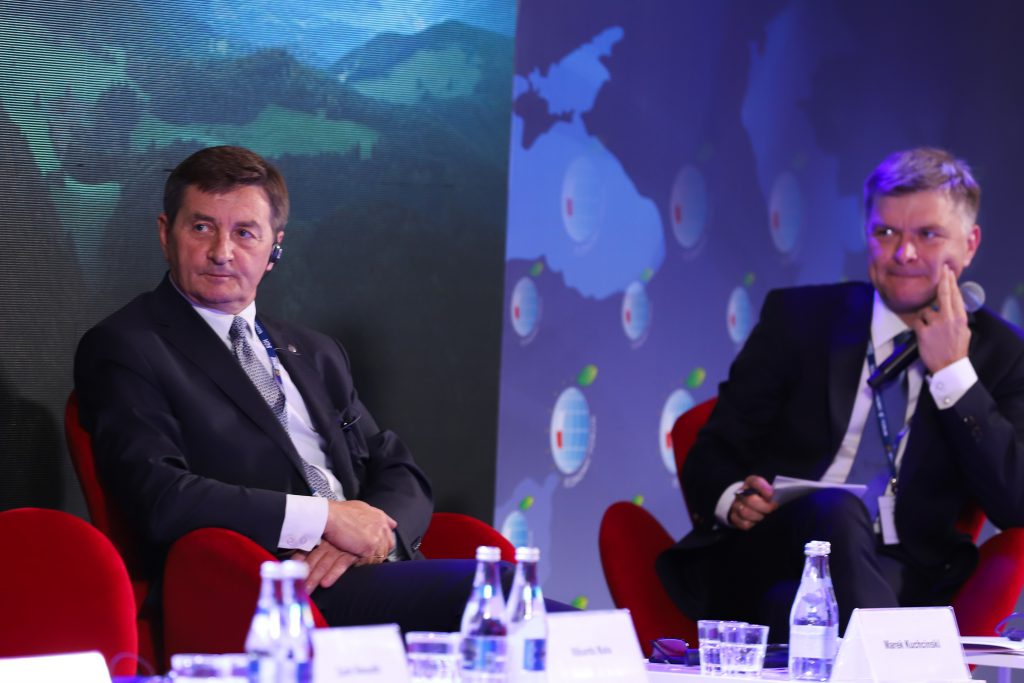
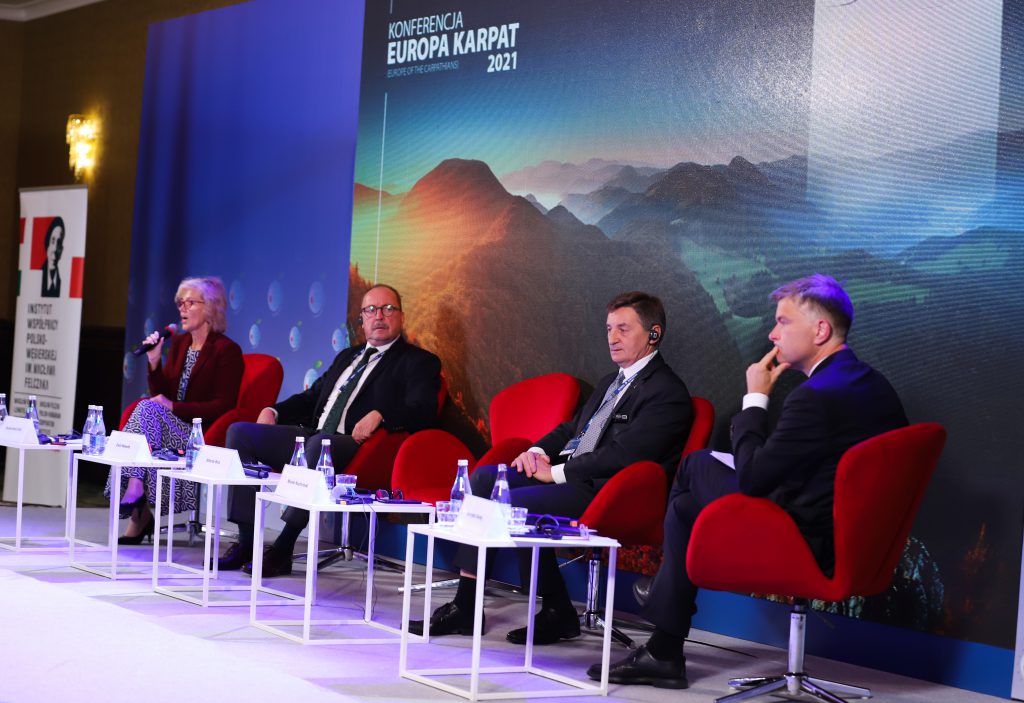
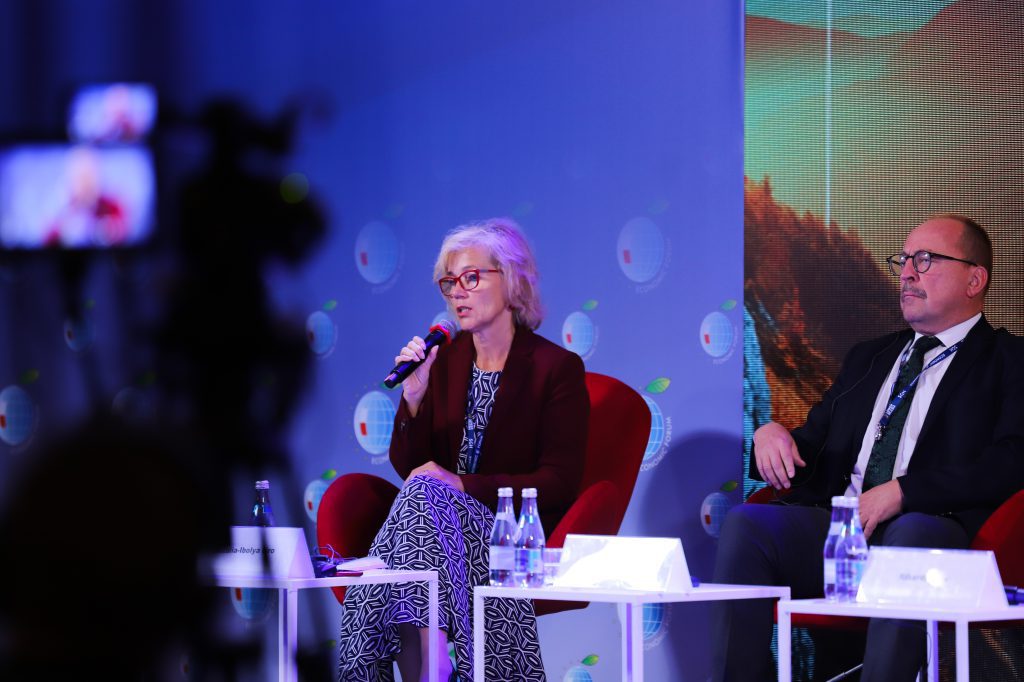
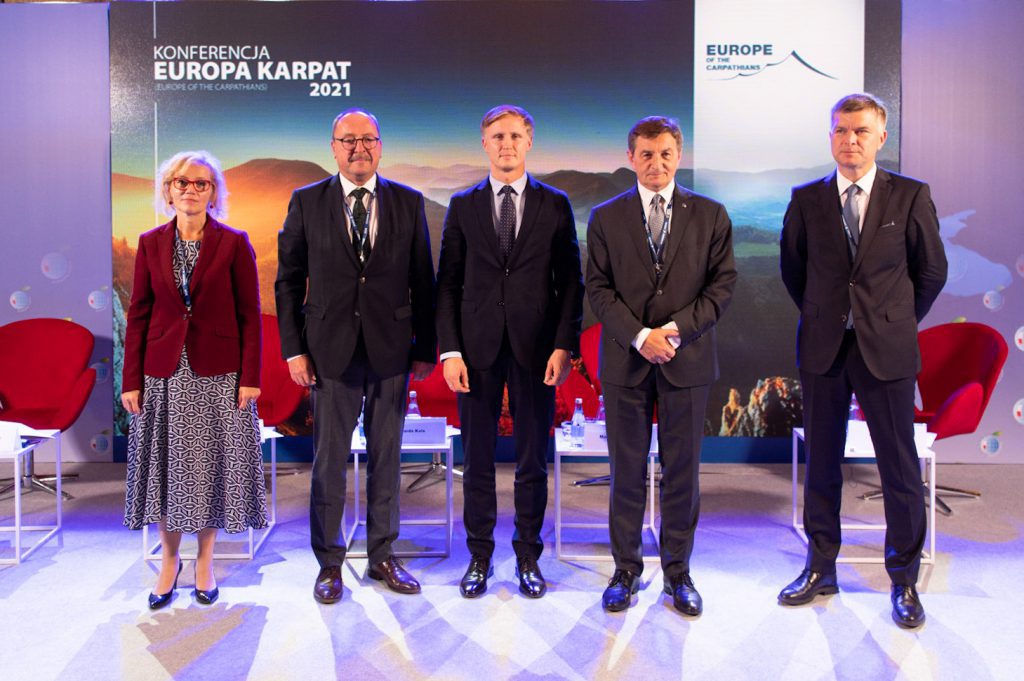
On Tuesday, 7 September, the 30th jubilee edition of the Europe of the Carpathians Conference began in Karpacz. On the first day of the conference, Polish and foreign experts, politicians and scientists discussed the problems of Central and Eastern Europe and strengthening cooperation, new challenges in international politics, energy security and socio-economic changes. The organiser of the Europe of the Carpathians Conference is the Chancellery of the Sejm, and the partner of the event is the Wacław Felczak Polish-Hungarian Cooperation Institute. Organised as part of the Economic Forum in Karpacz, the conference is attended by Agnieszka Kaczmarska, Head of the Chancellery of the Sejm.
The official opening was made by Marek Kuchciński, initiator and leader of the Europe of the Carpathians project. “The 30th edition of the conference entails several notions, perseverance and great horizons. We are looking from the peaks of the Carpathians at the political and social environment, at our life and activity. We start our conference with a panel in which young Europeans will speak about the future of Europe and Central Europe”, said the former Speaker of the Sejm, currently the Chairperson of the Foreign Affairs Committee.
(Central Europe) young people/youth about the future of Europe
The opening panel discussed strengthening relations in Central and Eastern Europe and upholding Christian and family values.
Ms Zsófia Rácz, Under-Secretary of State at the Hungarian Ministry for Human Resources, referred in her speech to the Krasiczyn Declaration, a joint declaration by participants in the Polish-Hungarian Summer University in Krasiczyn, adopted this summer, in which they declared that they would work together at political and civil level for a free, secure, strong and just Europe. “The Krasiczyn Declaration was received with great interest and much publicity. It is about remembering our roots in Europe. In Krasiczyn, we spoke of the strong ideological divisions in Europe, the conservative faction and, on the other hand, the liberal one. We must remember our past, that we young people have a great responsibility. We must question certain things, but also propose positive solutions and have a vision for the future,” she stressed.
The point of view of the Polish Government was presented by Piotr Mazurek, Secretary of State in the Chancellery of the Prime Minister, Government Representative for Youth Policy. “The issue of international cooperation of the representatives of the young generation, in particular from Central and Eastern Europe, is one of the key topics we should discuss. The cooperation seems natural and necessary. I am convinced that it will be possible to extend it. From the point of view of the Polish Government, it is very important to support the involvement of young people in public life, civic involvement, the inclusion of young people in decision-making processes, and we are doing this at all possible levels. On the one hand, we have established the central-level Council for Dialogue with the Young Generation, a new body, functioning for the first time in Polish history, where representatives of the President, the Prime Minister and Ministers begin an ongoing dialogue through regular meetings, work with the representatives of youth communities and NGOs,” he said.
“For the vast majority of the Belarusian society, but especially for the youth, the European Union and Europe as a whole remains a symbol of prosperity. Poland and Lithuania have recently become the countries that mark this Europe,” said Maxim Rust, a lecturer at the Belarusian Centre for East European Studies and editor of the bimonthly New Eastern Europe.
Stefan Tompson, a Polish-British journalist and columnist, said that he had never been more hopeful about the future of the region than he was now. “I have never been so optimistic about what has been achieved during the transformation, e.g. these 27 years of economic growth in Poland. We must take advantage of the opportunities we have,” he said.
Ferenc Almassy, a French-Hungarian journalist, also spoke in the discussion. “The Visegrad Group’s opposition to uncontrollable migration was a wake-up call for many Europeans who understood that we did not have to follow Western Europe in everything. We have our own choices and we can make them. We are just as European as anyone else and have the same right to discuss the future of the continent. We should understand that the world is changing; Europe is in a very difficult position. Globalisation has brought much wealth to Europe, but it has also brought great cultural changes. We have lost a great deal of our moral values, which were our foundation. The economy is not enough,” emphasised the editor-in-chief of the Visegrad Post news portal.
Yegor Stadny, Vice President of the Kyiv School of Economics, also spoke at Tuesday’s first panel. “Looking at the West, we learn how the world could be better, but we often forget how to behave. We do not do well in teaching young people responsibility, explaining that they are the future. We do not see any activity or initiative on the part of young people,” said the Ukrainian speaker.
Sviatoslav Yurash, a deputy of the Supreme Council of Ukraine, recalled joint initiatives such as the Lublin Triangle and the Three Seas Initiative. He also referred to the joint Polish-Ukrainian declaration made a few months ago, which assumed the rapprochement between the countries. “We will take all possible steps that will lead to our rapprochement; we must define Europe together,” he stressed.
The discussion was moderated by Sebastien Meuwissen, a Polish-Belgian journalist and editor of the Visegrad Post and Stand For Christians news portals.
New challenges in international politics: USA – Europe – Russia – China
In the second part of Tuesday’s meeting, the heads of Polish and Hungarian diplomacy discussed new challenges in international politics, among other things.
Péter Szijjártó, Hungarian Minister for Foreign Affairs and Trade, identified hypocrisy, double standards and the lack of genuine democratic debate in Europe as the biggest challenges. “We talk about challenges, about strengthening the EU. During these discussions in the Union, those who present views different from the mainstream are pushed out of the public debate. This is anti-democratic. As long as there is no space for a truly democratic and balanced debate, we will not be able to respond effectively to the challenges of the future,” emphasised the Hungarian politician.
“The greatest challenge facing us is to save the project of European integration. We joined a different Union. We understood the quintessence of integration to be the idea of a free market based on four pillars, freedom of movement for people, capital, workers and services. Today, these freedoms are not at their best. There are protectionist tendencies. What encouraged us to join the EU is now being reduced. The second issue has an institutional dimension. In the EU, we were fascinated by the community of law, by joint action on the basis of treaties. The EU institutions are expanding their competences in a non-treaty way. This is a dangerous phenomenon,” emphasised Minister of Foreign Affairs Zbigniew Rau.
The moderator of the discussion in the second panel was Przemysław Żurawski vel Grajewski, a lecturer at the Diplomatic Academy of the Ministry of Foreign Affairs and permanent advisor to the Parliamentary Foreign Affairs Committee.
Parliamentary diplomacy of the Three Seas Initiative
As part of this panel, representatives of the foreign affairs committees of the Three Seas Initiative countries discussed the call for a parliamentary dimension to it.
“Our parliamentary cooperation should reflect a community of objectives. In the framework of the Three Seas Initiative, we have the possibility to achieve these goals. From the very beginning, it is a living format, evolving from year to year,” said Rozália-Ibolya Biró, the Chairperson of the Foreign Affairs Committee of the Romanian Chamber of Deputies.
Zsolt Németh, a head of the Foreign Affairs Committee of the Hungarian National Assembly, said that the Three Seas Initiative is not an organisation but a young, very large, important political project. “It focuses on building a north-south infrastructure for the cooperation in our part of the continent. Our most important mission is to rebuild Central Europe. We have the opportunities, the economic conditions. Governments are getting more and more involved in the Three Seas Iniative projects,” he said.
Marek Kuchciński, a chairperson of the Sejm’s Foreign Affairs Committee, recalled that the possibility of closer parliamentary cooperation had been discussed many times during the pandemic. “30 years of free nations in Central Europe is a time in which enormous progress has been made. One of our fundamental goals is to ensure conditions for the development of societies, families and also to ensure cooperation with our neighbours. The parliamentary dimension should be present as one of the most important ones; our parliaments make decisions, approving national policies or supporting our cooperation in international terms. In this way, we build stability and a sense of security and a friendly attitude,” said the former Speaker of the Sejm.
Davor Ivo Stier, representing the Committee on Foreign Affairs of the Croatian Assembly, recalled that the Three Seas Initiative was launched at the level of presidents. “Now governments and parliaments are increasingly involved. The creation of a joint investment fund was a huge step forward. We need greater visibility, we need concrete action, and we should become involved in informing our citizens about the initiative. We should think about cooperation between parliamentary committees dealing with transport, infrastructure and energy,” he said.
“Thanks to the parliamentary cooperation, we can coordinate actions and create a strategic approach to connectivity in Central European countries. It is important to involve parliaments in discussions, exchange of ideas of this initiative,” said Chairperson of the Foreign Affairs Committee of the Saeima of Latvia Rihards Kols.
Žiga Turk, a former Minister for Development and Economic and Social Reforms of Slovenia, referred to the idea of institutionalising cooperation between the countries of the region. “We propose a digitisation budget in each country in order to create a mechanism for coordinating the joint use of the remaining funds. We have a common geography, history, culture; we have very compatible thoughts. We need to find specific projects around which we can use the synergy that exists between us,” he stressed.
The moderator of the discussion in the third panel was Grzegorz Górny, President of the Board of the Three Seas Association.


